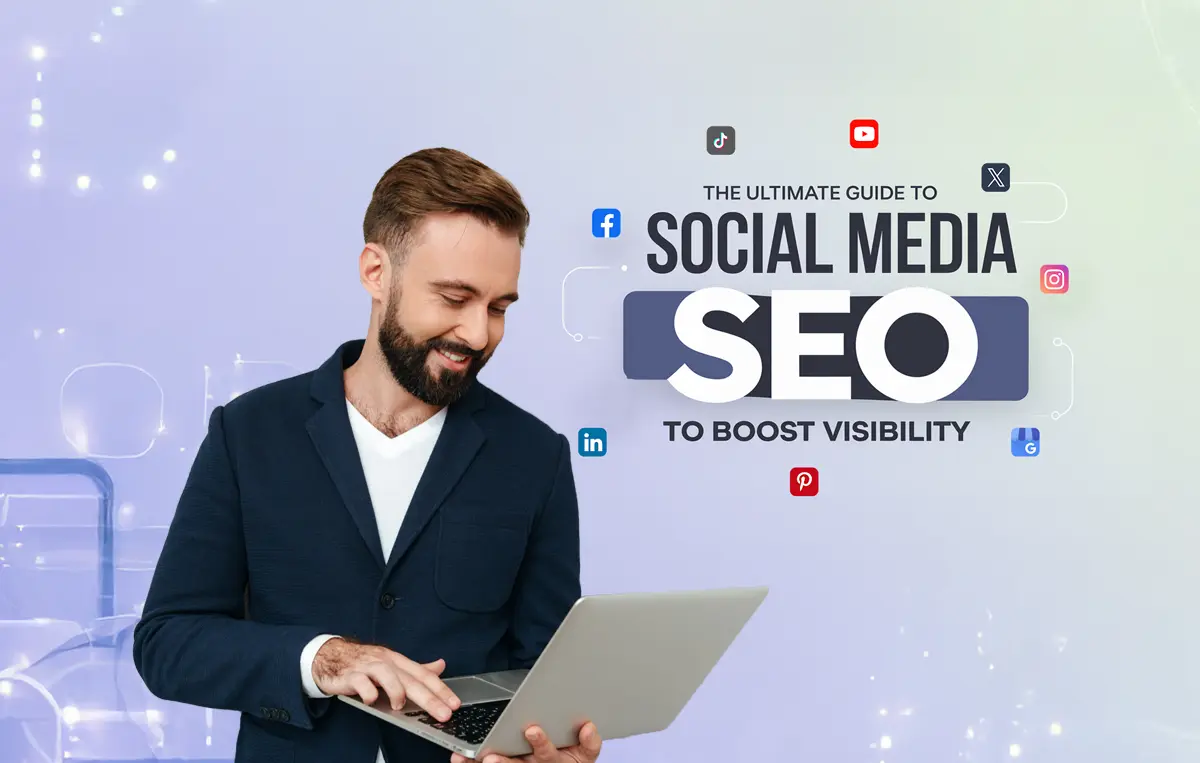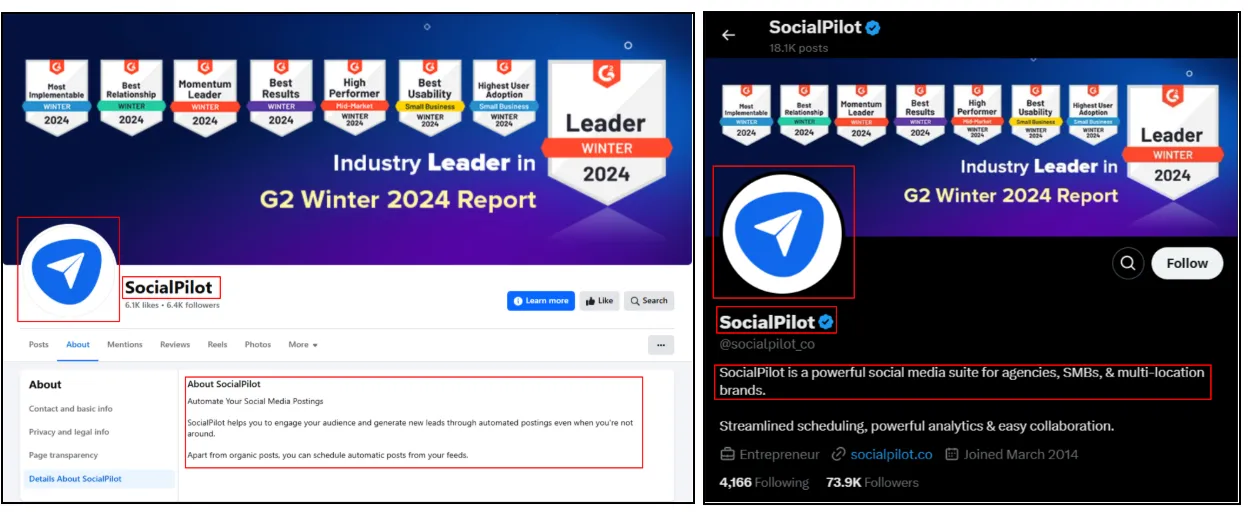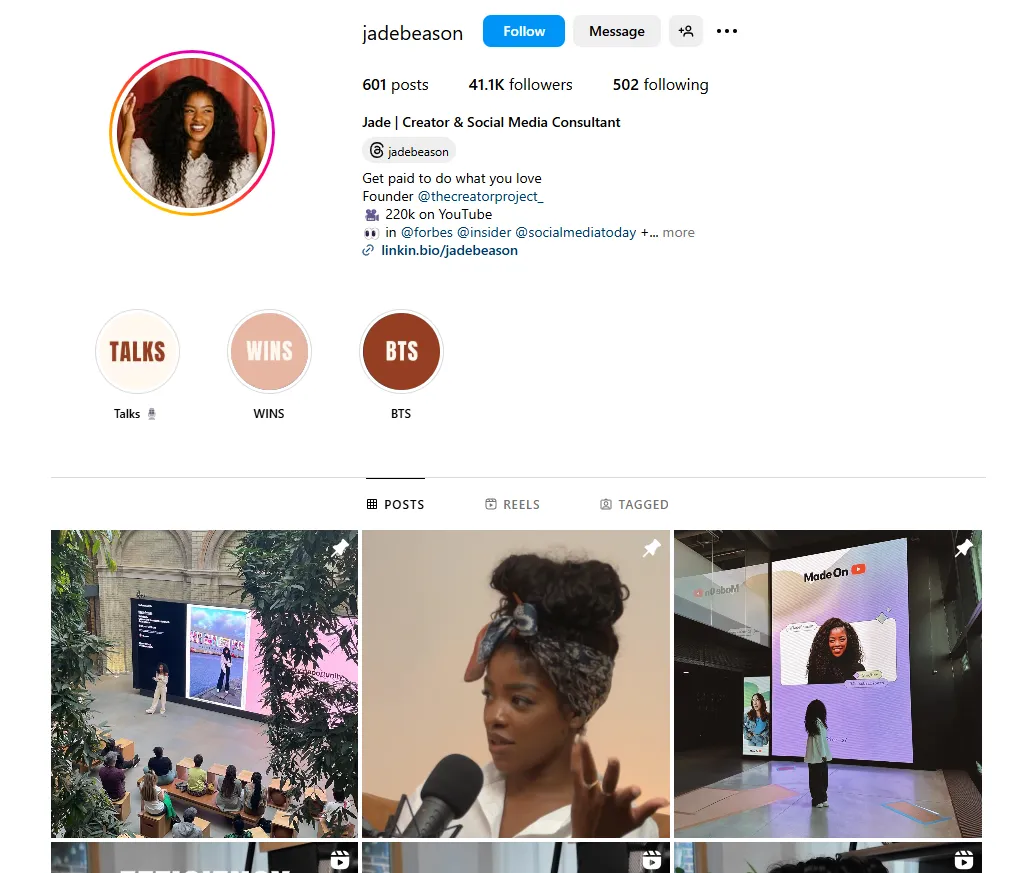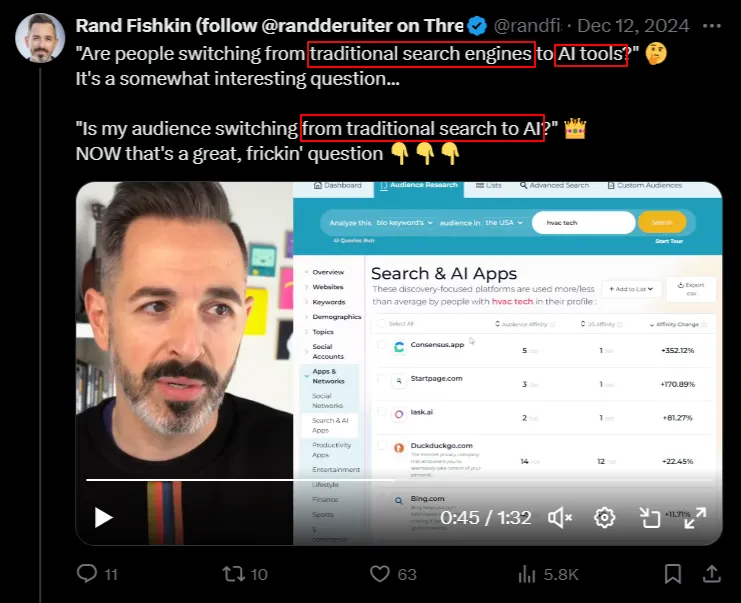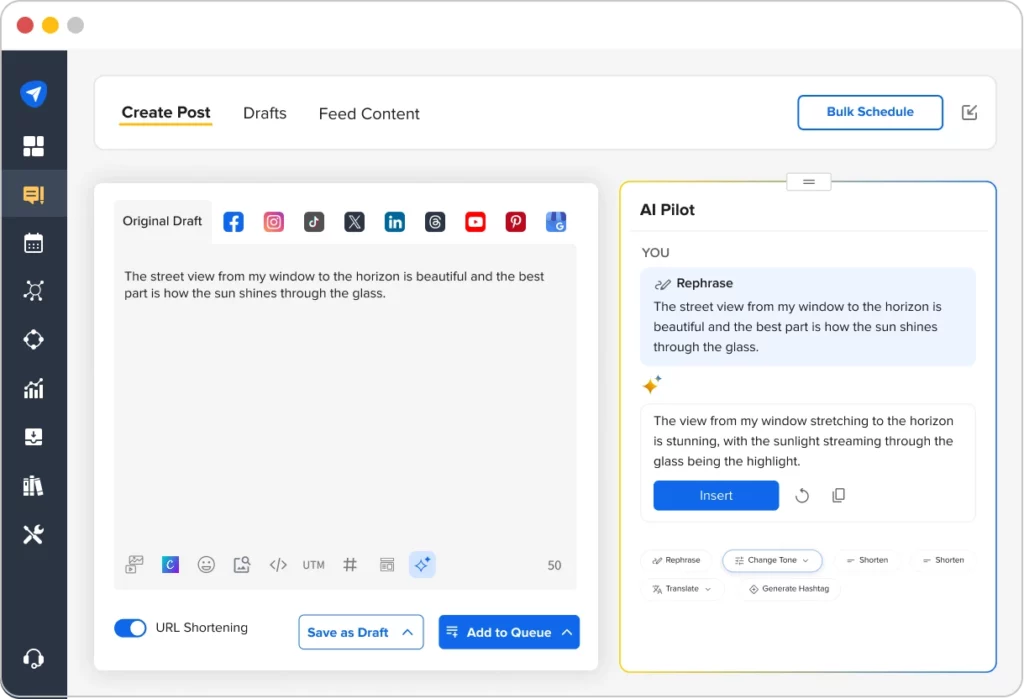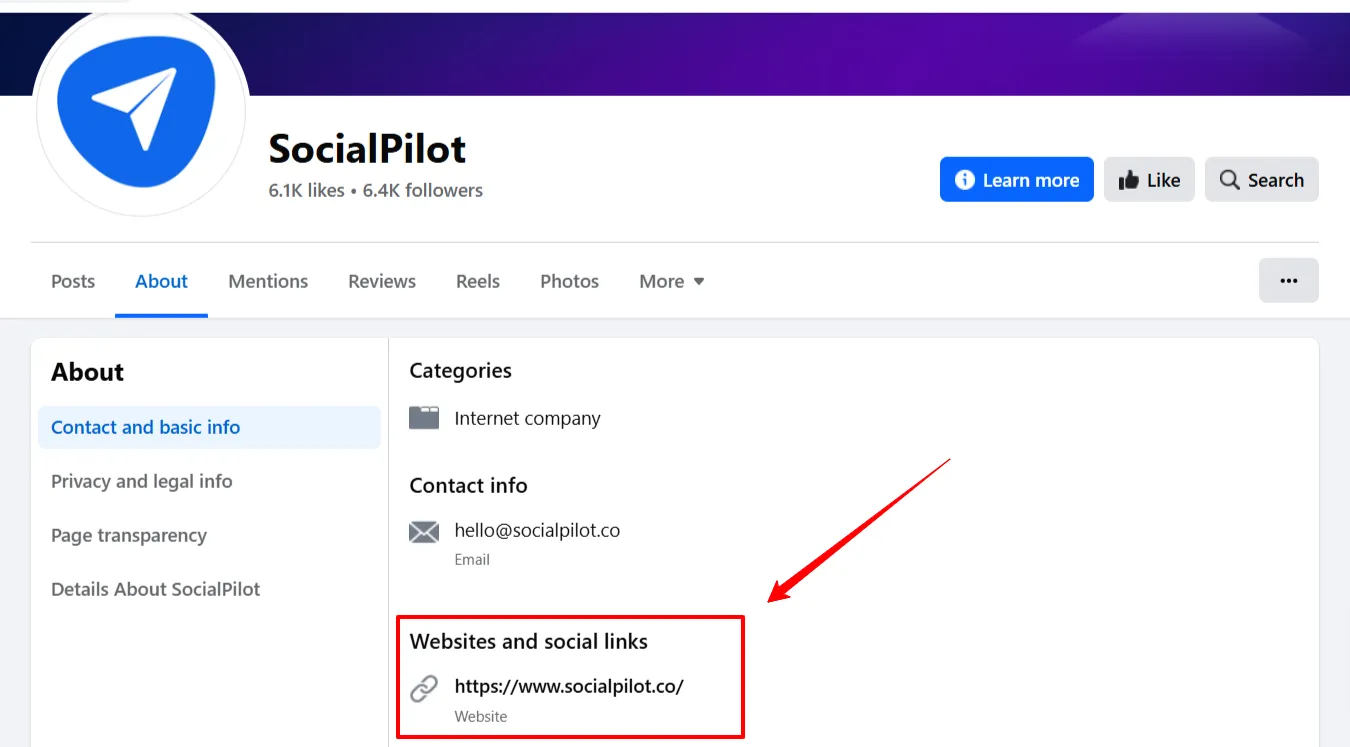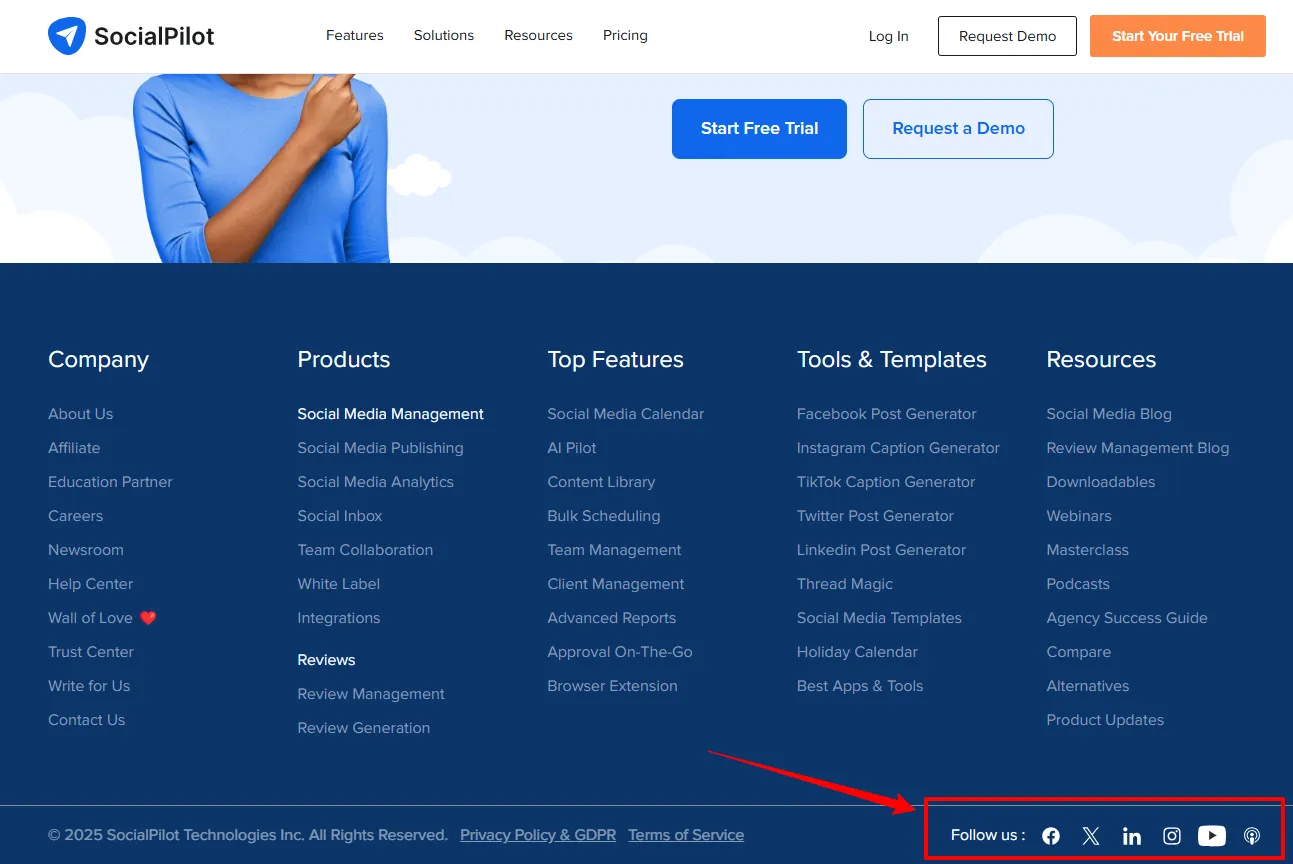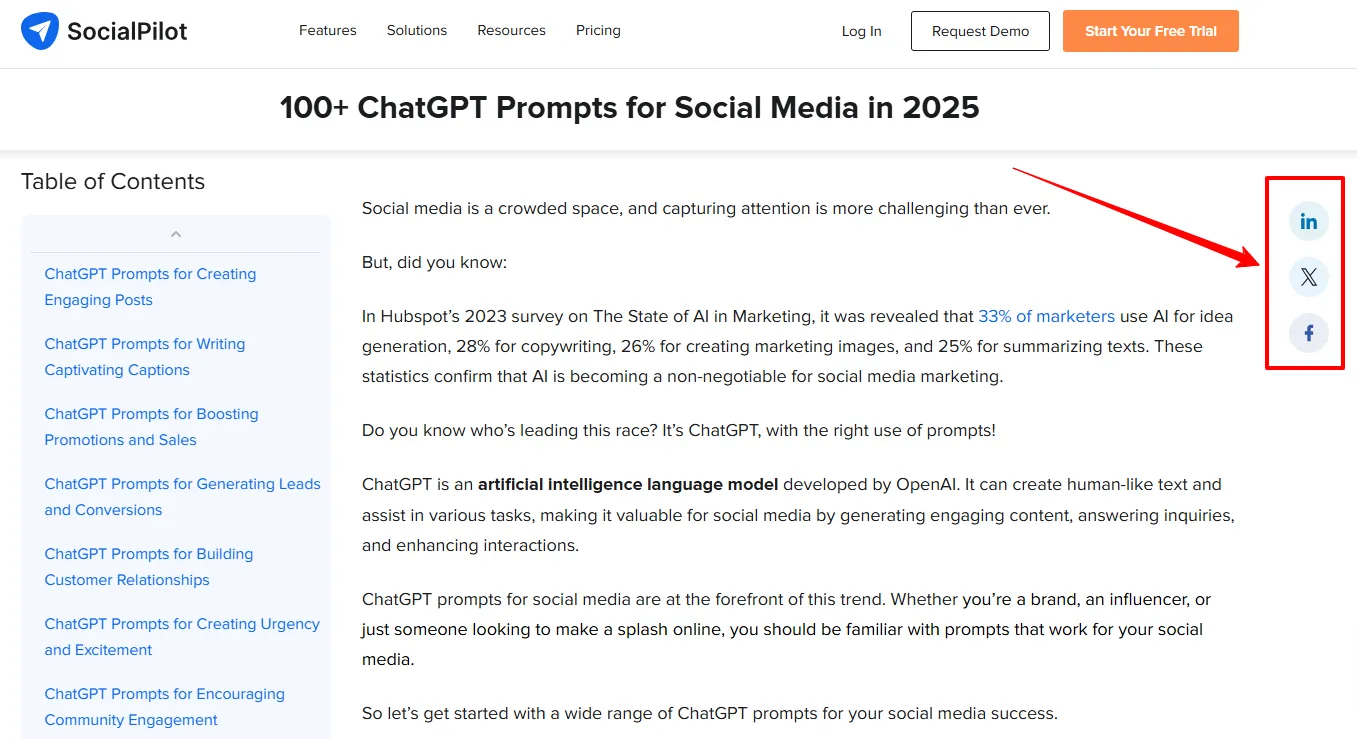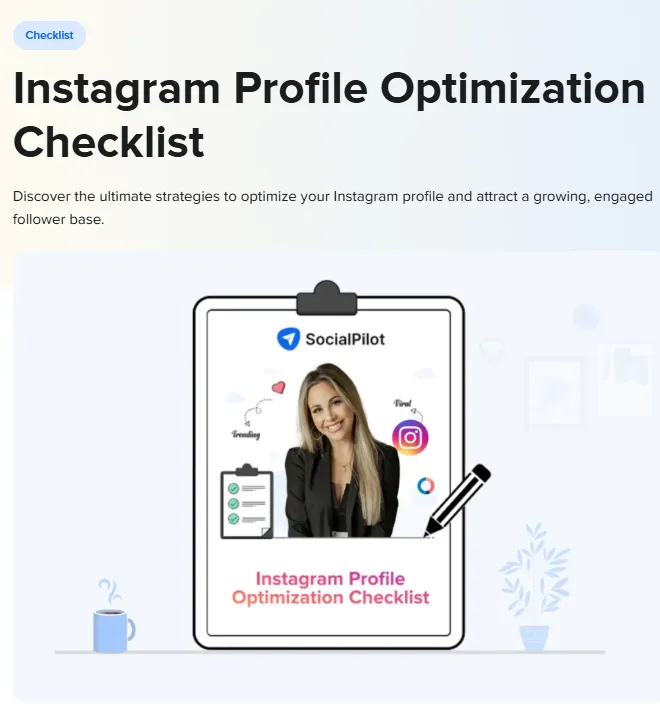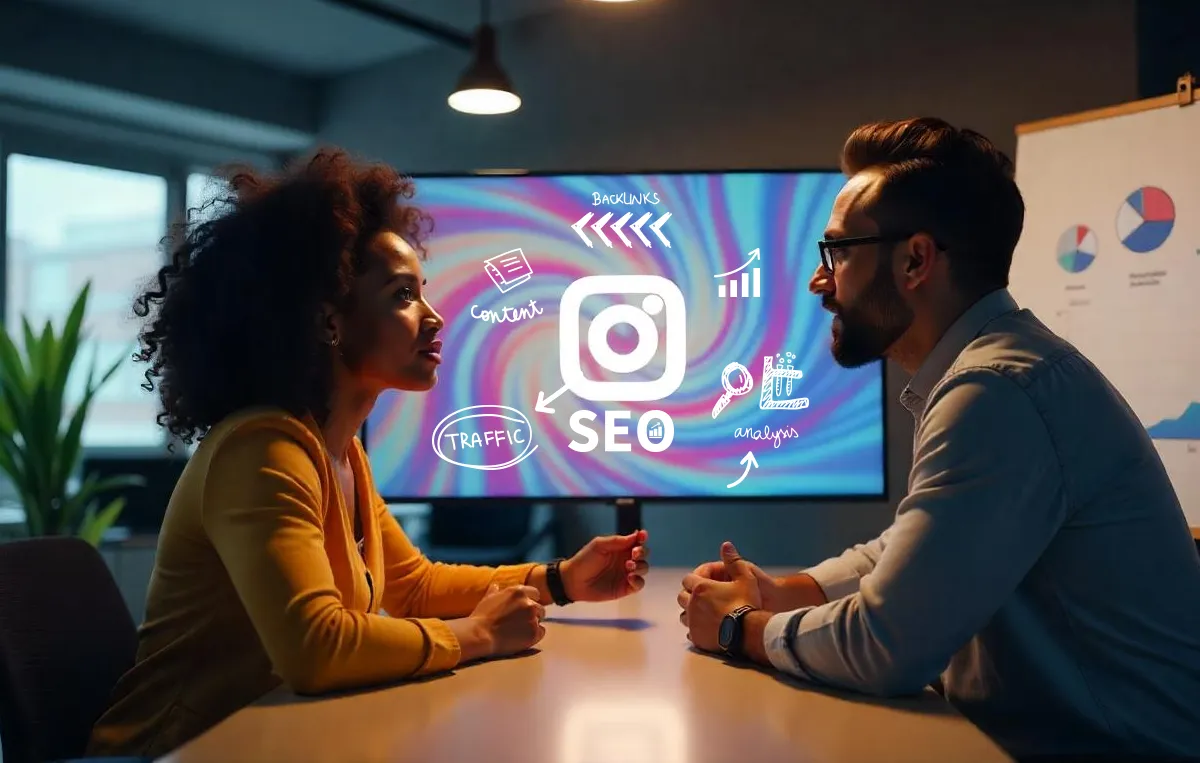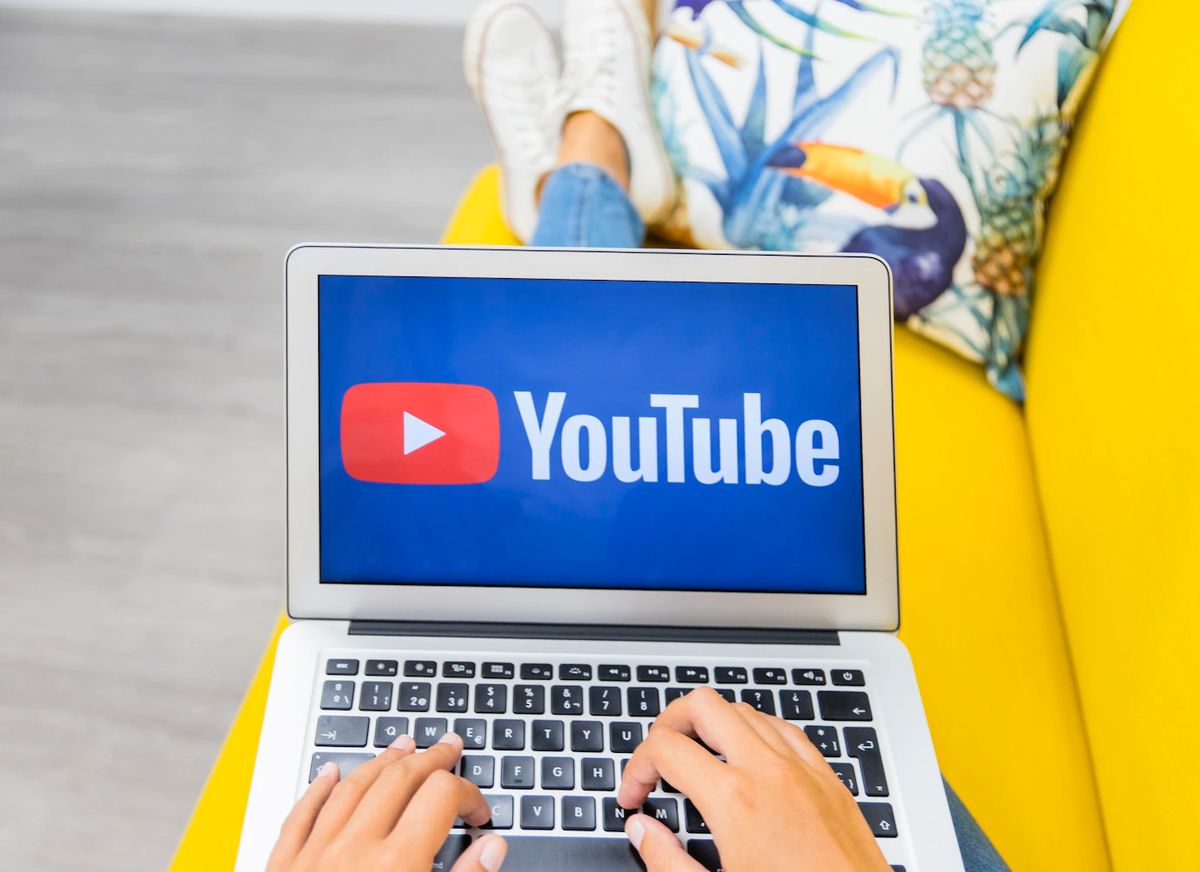If you’re serious about growing on social media, reaching more people, getting discovered, and eventually generating more business, you must master social media SEO to ensure your content rises above the noise.
Remember when Google was the go-to for all your searches? Those days are slipping away. Social media has officially stepped up as a rival search powerhouse. In fact, 24% of US adults now turn to social media as their primary tool for online searches.
That’s nearly one in four people choosing Instagram, YouTube, TikTok, Quora, Reddit, or Pinterest over a traditional search engine. According to a recent report by the New York Times, TikTok is the new search engine for Gen Zs.
Why? Because it’s seamless. It keeps everything in one ecosystem. From discovering new brands to shopping, learning, and exploring trends, social platforms have become the new digital frontier.
And every social channel knows it, as they are all doubling down on their search functionalities. The Meta AI search function is now on Instagram, indicating that social search continues to evolve.

If your content isn’t optimized for social media search, you’re not just missing out but falling behind. It’s time to treat your social media strategy like the SEO powerhouse it can be because the future of SEO is social media, and we will make sure you’re ahead of the curve.
Ready? Let’s dive in.
Social media SEO is optimizing your content for platforms like Instagram, TikTok, Pinterest, YouTube, etc, to ensure it shows up when people search within those platforms. It is search engine optimization for social media essentially to boost discoverability.
But, this social SEO is not just limited to social media. Google is showcasing content from YouTube, Instagram, Pinterest, etc, within its search results. This means when you optimize your social media content, the chances of it appearing in Google searches also increase.
This new phenomenon, also called social search, replicates what a user would do in Google or any other search engine on social media platforms. This proves that social media isn’t just about pretty pictures or viral dances anymore; it’s about creating discoverable, relevant, and engaging content that aligns with what users are actively searching for.
Social Media SEO Vs. Traditional SEO
Using traditional SEO practices, you can optimize your website and rank it on Google, Bing, or other search engines through backlinks, technical optimization, and keywords.
On the other hand, SEO for social media optimizes your social posts to get discovered faster and better when users search within the platform based on dynamic engagement-driven visibility.
- Traditional SEO relies on search engines crawling your website.
- Social media SEO is more about how well your content engages and aligns with user intent within a platform’s ecosystem.
Traditional ranking signals directly impact the ranking of your website on Google, which means that social media SEO ranking signals can indirectly influence your content or website’s search engine ranking. These signals include:
- Engagement: Likes, comments, shares, and saves.
- Keywords: In captions, hashtags, and profiles.
- Profile Optimization: Branding, bio description, Images, and links.
- Followers and Subscribers: Your audience on each platform.
- Views: On YouTube, Instagram Reels, TikToks, Shorts, etc.
- Brand Mentions: Brand name mentioned in posts, Reels, captions, profile, etc.
Vital Ranking Signals for Social Media Platforms
- Facebook: Engagement, optimized business page, location, content shares, and keywords.
- Instagram: Hashtags, Alt text, engagement, location, subtitles, and profile optimization.
- LinkedIn: Keyword, engagement, content type, and recommendations and endorsements.
- Twitter: Retweets and likes, hashtags, concise and keyword-rich content, and links.
- YouTube: Keywords in titles and descriptions, tags, watch time, engagement, retention rate, transcript, and subscribers.
- Pinterest: Keywords, quality visuals, board organization, and saves.
- TikTok: Trending sounds and hashtags, engagement, captions, and consistency.
- Quora: Optimized profile, niche-specific long-tail keywords, relevant links, knowledge sharing, answering new questions, and building community.
- Reddit: Authenticity, optimized profile, karmas, upvotes, shares, participation in subreddits.
1. Profile Optimization
Optimizing your profiles for SEO for social media is about making them search-friendly. It means ensuring your profiles are structured so social media algorithms, users, and even search engines like Google can easily find and understand them.
Why it’s Important:
If your profile is optimized, you have a strong storefront that is easy to find. Platforms like Instagram, LinkedIn, and TikTok rely heavily on profile metadata (name, bio, and links) to display search results.

Not only that, Google also sometimes indexes social media profiles that give additional visibility. For example, when you search for a person on Google, there is a chance that their social profile will show in the results.
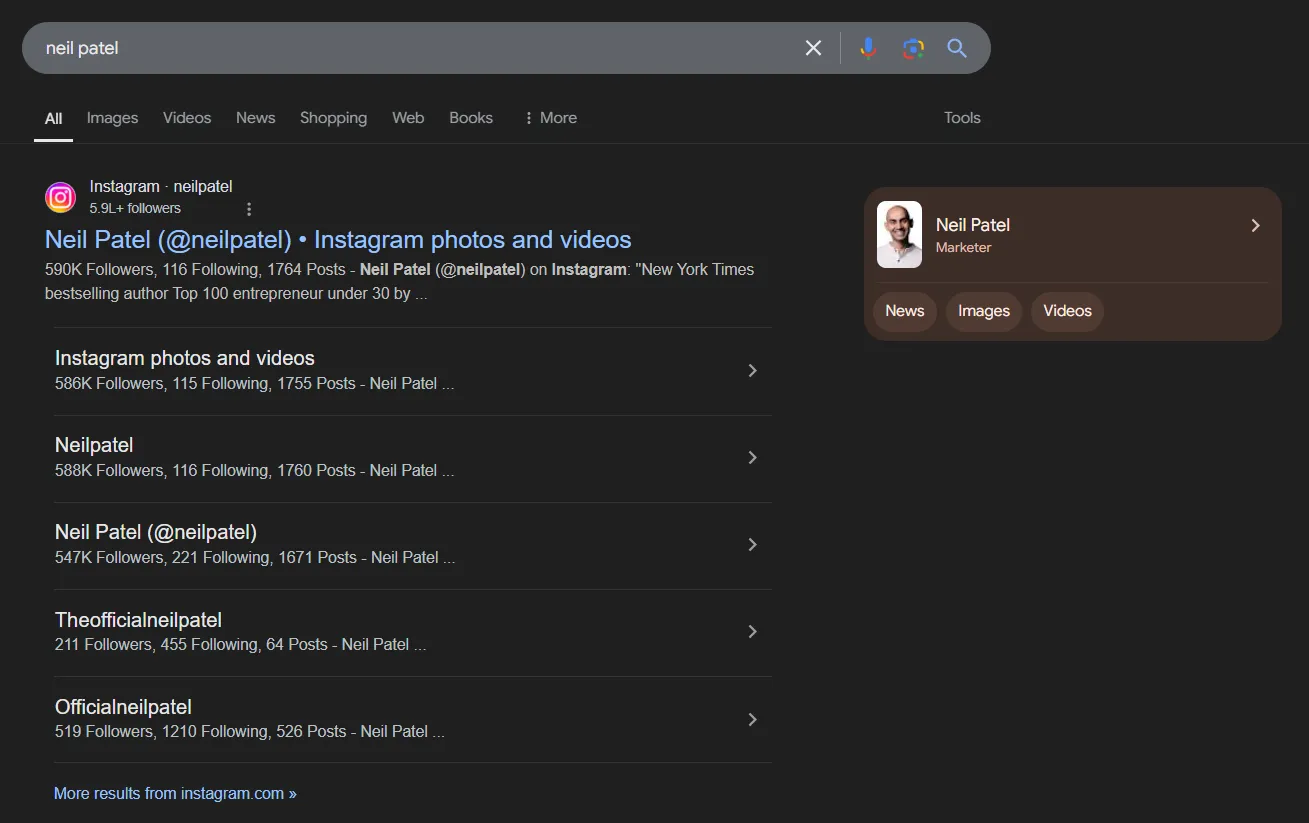
Actionable Strategy for Profile Optimization
- Consistency Across All Social Profiles: Ensure your user name and profile name, profile picture, address, details, etc, match your brand and are the same on all social platforms. This boosts discoverability and helps the audience know you or your brand on each platform.
- Integrate Relevant Keywords and Hashtags: Identify and add relevant niche-specific keywords and hashtags to your bio. If you are a logo design agency like design.com, you can add Logo Design, Best Logo Design Agency, etc.
- Include Website/Important Links: In your profile bio, add a clickable link to your website. You can also add more than one link on some social platforms, but if you want more diversity, use tools like Linktree or Milkshake. On Instagram, you can now add upto five links.
- Add Clear CTA: On Instagram, Facebook, and many other social platforms, you can also add CTA. Keep it as clear as possible, like “call,” “message,” or DM for custom orders, book sessions, etc., to directly encourage actions.
- Pin High-Performing Content: Keep your best-performing content or most relevant posts pinned to the top for quick engagement. You can see something similar done by Jade Beason, who has pinned 3 of her best-performing content on Instagram to present her to existing or new audiences.
2. Optimization Posts for SEO
Post optimization for social media SEO is not just about uploading a post. It’s about creating content that ranks higher in search results within the platform and even on Google.
Why it’s Important:
Social media platforms increasingly rely on metadata and user behavior to surface relevant content, while tools like Google Lens use image data to rank posts visually, making visual optimization more critical than ever.
On TikTok, 87.3% of videos have at least one hashtag and a keyword. This visibility creates a ripple effect, boosting clicks, shares, and even backlinks.
Actionable Strategies for Post-Optimization
- Use Niche Keywords and Hashtags: Conduct good keyword research and add target keywords in captions and graphics. Combine hashtags with broad and niche teams and add captions, stories, and comments.
Check out how Rand Fishkin has used popular keywords in his Twitter/X post to benefit from social SEO practices.
- Add Alt Image Text: One of the most unknown post optimization strategies for SEO. Write descriptive alt text for every image to improve accessibility and rank better for Google Lens or Pinterest.
Facebook, Instagram, Threads, Twitter/X, LinkedIn, Pinterest, and BlueSky allow users to add alt-image text to their posts separately to improve SEO for social media and discoverability.
- SEO Titles and Subjects: Create clear, keyword-rich titles that describe the content’s value; this is especially beneficial for YouTube video titles. Keep the title short and include power words extending to long tail keywords.
- Add Subtitles and Transcripts: Include subtitles for short-form content (Instagram, TikTok, etc) and transcripts for long videos (YouTube) to improve accessibility and make your content searchable by keywords
Having subtitles increased video viewing by 40%, and where subtitles appeared, 80% more people watched the entire video.
- Graphics and Thumbnails: Make visually appealing graphics and thumbnails with keywords, precise subjects, minimal text, and vibrant colors. Make sure your image aligns with your keywords. Google Lens scans the visual content of images and ranks them accordingly.
- Share Authoritative Content: Sharing authoritative content such as data-driven updates, thought leadership pieces or in-depth guides establishes your credibility and increases shares and engagement, which are crucial ranking signals.
Leverage SocialPilot’s AI Pilot to simplify your social media post optimization.
An intelligent AI tool designed to generate SEO-friendly captions, hashtags, post ideas, change the content tone, rephrase for various platforms, etc, to optimize your posts, titles, descriptions, graphics, and make them more specific to every social channel.
AI Pilot simplifies the process and ensures your content is aligned with social media SEO best practices.
3. Engage with Your Audience
Engagement is the key ranking signal for social media SEO. Social platforms prioritize content that gets likes, comments, shares, and saves more as it indicates relevance and value and pushes them to discovery pages like Instagram Explore, TikTok For You, or Facebook News Feeds.
Engagement gets your content directly to get better discoverability on social media and indirectly on search engines like Google. Higher social media engagement means more profile traffic and increased backlinks, eventually encouraging search engines to view your content as authoritative.
Why it’s Important:
If your audience engages with you regularly, they advocate for your content. Facebook has a live video engagement of 0.46%, and highly engaging content is 3.6 times more likely to get ranked in social media searches, leading to greater visibility.
Platforms like Instagram reward responses to comments and DMs with better algorithmic ranking.
Actionable Strategies to Engage Your Audience
- Reply to Comments, Mentions, and Messages Using Keywords: Incorporate keywords naturally when responding to comments, mentions, and messages. This ensures your interaction contributes to SEO.
- Host Live Events with SEO Titles: Choose a keyword-rich title for your live sessions to increase discoverability. Example: “Live: Master Social Media SEO in 2025 – Top Tips!” This ensures your live stream ranks in searches on YouTube and Instagram.
- Incorporate User-Generated Content (UGC) with Branded Keywords” Encourage followers to use branded keywords or hashtags when creating content. For instance, A campaign like “Share your fitness journey with #FitProSEO” increases engagement while linking to your brand and SEO efforts.
- Ask SEO-Optimized Questions in Captions: Create open-ended questions using keywords that align with the niche, encourage meaningful interactions, and improve post-discoverability.
Creating a seamless connection between your website and social media accounts means linking your website on your social platforms while embedding social media links and feeds into your website.
This ensures a two-way flow of traffic that strengthens your digital presence, increases visibility, and enhances your social media SEO.
Why Is It Important:
When you optimize your social media with your website link in prominent positions like bios, posts, stories, etc, you direct followers to your site and increase traffic. Integrating social media links can boost website traffic.
As noted by Ketchup Marketing, social media links play a significant role in driving organic traffic and signaling credibility to search engines.
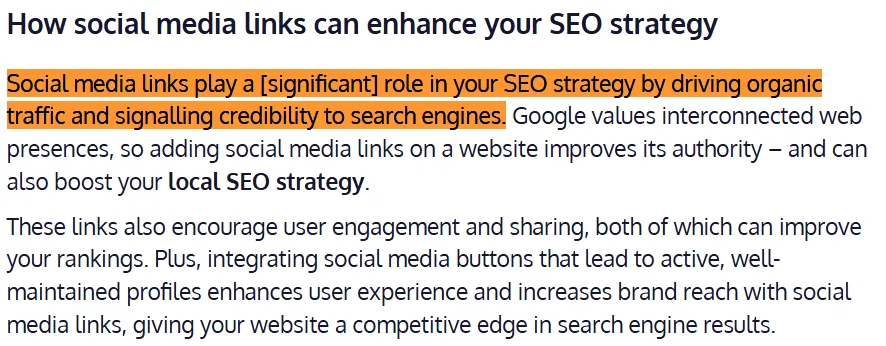
Linking your social feed on your website and website on social can derive traffic between platforms, improve brand trust and consistency, strengthen social media SEO search signals, and encourage engagement access platforms.
Actionable Strategies to Link Website and Socials
- Add Website Link to Your Social Media Profile: Use your website URL in your bio on platforms like Instagram, TikTok, LinkedIn, and Twitter.
- Link Your Website in Social Media Content: Include website links in post captions, such as blog posts, product pages, or event sign-ups. Use Instagram’s Link Stickers in stories to add clickable links.
- Embed Social Media Links and Feeds on Your Website: Place social media icons (linked to your accounts) in your website’s header, footer, or contact page. Embed live feeds from Instagram, Twitter, or Pinterest on your homepage or blog to showcase recent activity and encourage social engagement.
- Use Social Proof to Highlight Website Content: Share social testimonials, reviews, or user-generated content on your website to encourage trust and boost SEO.
To signal social media SEO and rank higher on Google, you can encourage your website visitors to share your content on their social feeds.
Having social sharing options of buttons on your website pages means distributing content such as articles, images, or videos from a website to a social media platform. This practice can be beneficial when these sharing buttons are placed strategically on the website, like blogs.
Why Is It Important:
When one of your website visitor shares your article on their social accounts, it increases your website traffic. Also, this reaches a broader audience, leading to increased visibility and brand awareness.
This increased visibility can lead to more traffic to the website, which can, in turn, improve SEO performance. This, in turn, hints at social signals such as likes, shares, and comments that provide search engines with insights into the popularity and relevance of content.
A study by AppLabx says that social media SEO signals are vital for search engine ranking.
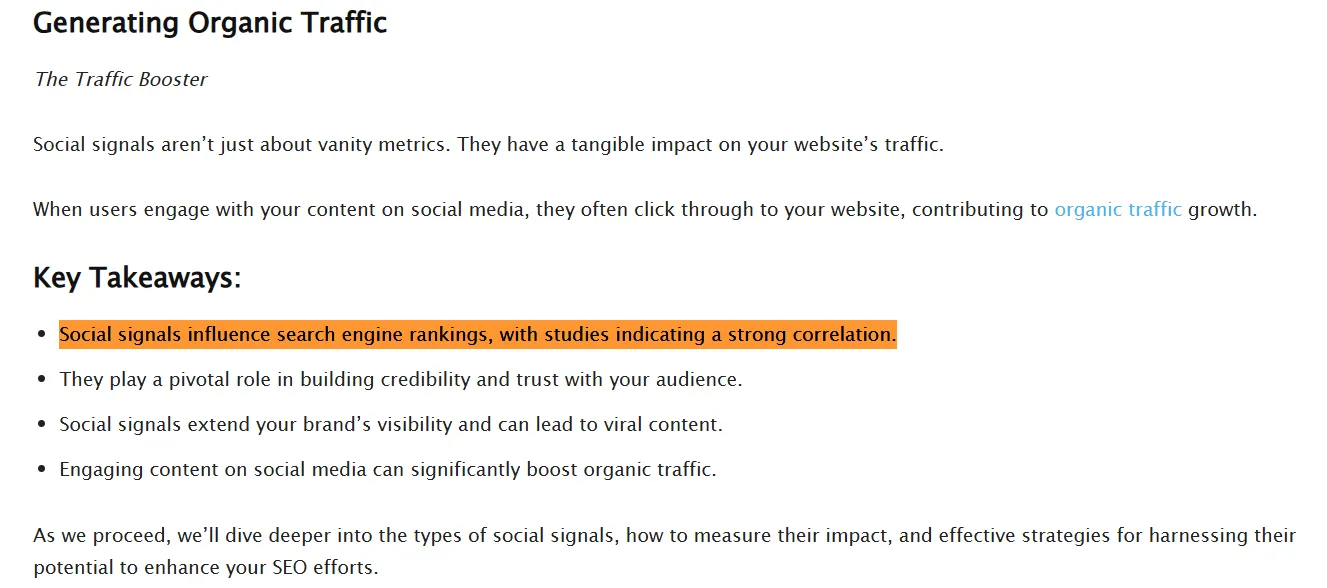
Actionable Strategies for Optimize Website Content for Social Sharing:
- Create High-Quality Shareable Content: Develop content that provides significant value to your audience, such as in-depth guides, insightful articles, or entertaining media and visuals like images, infographics, or videos. High-quality content is more likely to be shared.
- Implement Social Sharing Buttons: Position social sharing buttons prominently on your website, such as at the top or bottom of articles, to encourage easy sharing.
We have included sharing buttons for social media platforms on our blog to encourage easy sharing.
- Craft Compelling Headlines and Descriptions: Write attention-grabbing headlines that encourage clicks and shares. Provide clear and concise descriptions that effectively convey the value of the content.
- Ensure Mobile Optimization: Optimize your website for mobile devices to ensure a seamless user experience, as a significant portion of social media access occurs on mobile.
In traditional SEO, backlinking means linking a website with your website, which generates traffic for both. Social media backlinks are links from your website shared on platforms like Facebook, Instagram, LinkedIn, and Twitter that direct users to your website.
Why Is It Important:
Yes, social media links are not followed and do not pass any equity directly to your site, but they can generate traffic, build credibility, and improve overall search engine ranking.
You can know how much traffic your website-linked social post has generated using tools like bitly to understand how much traffic that particular post has generated for your website.
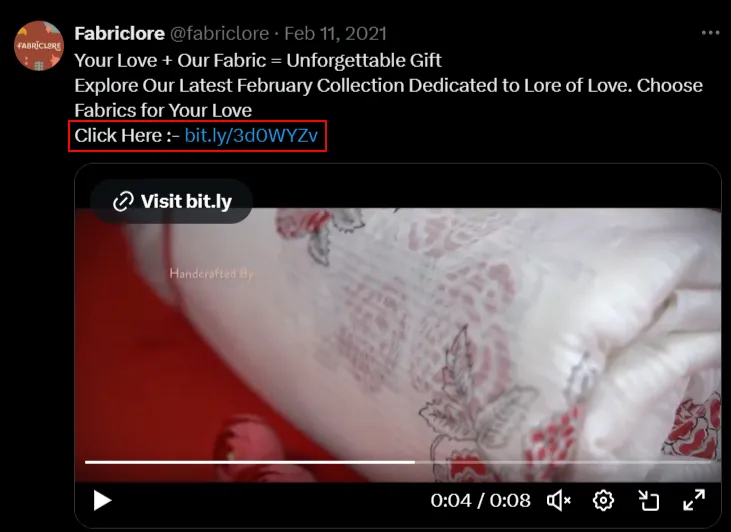
Having your website linked to your social media activities connects your website and social content. This way, you can get your social media post rank in the search results when someone searches about your brand.
Additionally, shared links on social platforms often lead to external backlinks. For example, other websites or bloggers might reference a popular tweet linking to a blog post, generating high-quality “do-follow” links.
Actionable Strategies to Build More Social Media Backlinks
- Post Regularly with Links to Your Website: Share blog posts, product pages, or services regularly on social media platforms. Use compelling CTAs in captions, like “Click to read more” or “Shop now,” to encourage clicks.
Are you struggling with your CTAs?
We’ve got you covered!Say goodbye to guesswork and hello to results.
Learn how to craft the best CTA now! ➡️ https://t.co/OOhDf37Paw
#SchedulingTools #MarketingTools #SocialMediaManagement pic.twitter.com/rI9iXNfS01
— SocialPilot (@socialpilot_co) March 11, 2024
- Encourage Social Shares: Run campaigns or contests where followers share your posts with website links to win prizes or recognition. Use branded hashtags to track these shares and encourage UGC.
- Publish Backlink Worthy Content: Create high-value assets like infographics, industry reports, or webinars that provide unique insights. These highly shareable formats attract backlinks from social media and authoritative websites.
Below is the perfect example of sharable, backlink-worthy content viewers can share, such as a session or webinar.
Tired of chasing every new social media trend?
Join us for a real talk about what’s actually working in 2025. No fluff, no buzzwords – just practical insights from folks who’ve been in the trenches.
J.S. Stansel (who shaped social for Avatar and LOTR) and Katie Murphy from EYR… pic.twitter.com/0DQqMaBLqK
— SocialPilot (@socialpilot_co) January 7, 2025
- Repurpose Website Content for Social Media: Break down blog posts or guides into bite-sized infographics, videos, or carousels with links to the original content.
7. Collaborate with Influencers from Your Niche
Influencer collaboration involves partnering with individuals with substantial and engaged following within your industry. These influencer collaborations can help you rank higher in social searches by improving your SEO.
When you collaborate with a niche influencer, their engagement, audience, and reputation work for you. This amplifies your brand and extends the reach by sharing content wider.
Why Is It Important:
Partnering with niche influencers can significantly boost your brand’s visibility and engagement. 69% of consumers trust the influencer recommendations over the brand.
According to Brightedge, influencer marketing can improve your SEO. It helps with the elements like:
- High-quality Backlinks
- Increased Content Reach and Engagement
- Enhanced Brand Trust and Credibility
This LinkedIn blog also proves that influencer collaboration can improve social SEO.

Actionable Strategies to Improve Social SEO with Influencer Collaboration:
- Request Backlinks in Blog or Video Content: The oldest strategy is to partner with influencers for blogs, LinkedIn articles, and YouTube videos where they naturally mention and link your brand. This gives you a high-quality backlink from trusted influencers.
- Launch a Co-Branded Campaign: Collaborate with influencers where they share exclusive offers, product launches, or educational content on social media and include your website link. This eventually drives referral traffic to your site.
- Create Shareable Resources with Influencers: Co-create downloadable guides, ebooks, or webinars with influencers that link to your site for access. This also increases backlinks.
To leverage this strategy, we collaborated with social media expert Katelyn Rhoades to create an Instagram profile optimization checklist. This offered both of us high engagement and traffic to our website.
- Collaborate on Video Content: Work with influencers to create video tutorials or product reviews on social media and ensure your website link is included in the video.
Similarly, we collaborated with a Meta expert for the webinar and shared it on social media, linking our pages and website. This again generated authority and more reach.
- Offer Exclusive Discounts or Affiliate Programs: Provide exclusive offers and discounts or affiliate links to your website to share with their social media followers. This increases clicks and conversion via social media SEO.
Want to know how much more reach you get when you share collaborative posts on Instagram?
It’s all inside our Instagram Trends 2025 Report
We are sure you must be fully aware of the importance of social media and SEO. But let’s point it out for you more clearly.
1. Increased Website Traffic
A well-executed social media SEO strategy significantly boosts your content discoverability within the platform and in the search engine results. This way, you get more visitors to your website, increasing traffic signals to search engines about your site’s relevance and authority.
2. Enhanced Brand Visibility
Optimizing your social media profiles and content increases your brand’s presence across multiple platforms, making it easier for potential customers to find and recognize your business. This widespread visibility builds brand awareness and trust.
3. Improved Content Discoverability
By incorporating relevant keywords and hashtags into your social media posts, you enhance the likelihood of your content being discovered by users searching for related topics on social platforms and through search engines.
4. Platform-Specific SEO Advantages
Each social media platform has unique algorithms and search functionalities. Tailoring your SEO efforts to fit these requirements can improve your content’s visibility within those platforms, reaching a more targeted audience.
Social media optimization is increasingly important in search engine optimization, influencing website visibility
5. Directly Impact on Sales
A well-optimized social media presence builds trust with potential buyers. When users see consistent activity, customer engagement, and positive reviews, they’re more likely to convert into customers.
Gone are the days when SEO was confined to Google’s algorithm. Social media has become the new frontier, where optimized content isn’t just discovered; it’s engaged with, shared, and converted into sales. If your strategy isn’t built around social media SEO, you’re leaving growth opportunities untapped.
By optimizing profiles, tailoring content, and embracing platform-specific strategies, you’re not just boosting clicks; you’re building trust, visibility, and long-term success. Remember, social media SEO is about being found in the right places at the right time.
If this feels overwhelming, SocialPilot’s social media management tool is here to make your life easier. So, leap and start optimizing because if your brand isn’t searchable on social media, you’re missing out on the biggest stage of the digital age.
